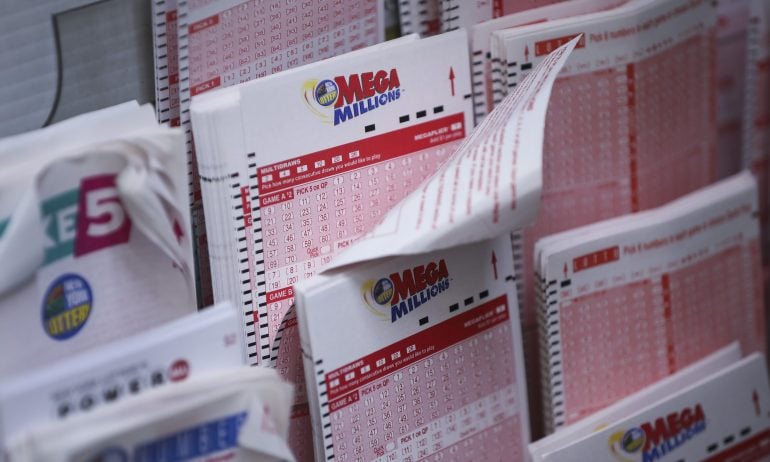Lottery Pool? Take These Precautions Before Diving In

Many or all of the products featured here are from our partners who compensate us. This influences which products we write about and where and how the product appears on a page. However, this does not influence our evaluations. Our opinions are our own. Here is a list of our partners and here's how we make money.
If you like to play the lottery, you might be looking to improve your odds of winning the jackpot by joining a lottery pool. It can be a thrilling way to socialize with others in your office, like filling out a March Madness bracket. But if luck strikes, the stakes can be a lot higher.
What is a lottery pool and how does it work?
In a lottery pool, a group of people (often coworkers) team up to buy a bunch of lottery tickets and agree to split the payout if they win.
Consider the $1.3 billion Powerball jackpot up for grabs in April. The cash option was $608.9 million. If you and five of your work friends had formed a lottery pool and won, you each would’ve walked away with more than $100 million before taxes.
The idea is that by pooling your money and buying multiple tickets, you improve your chances of winning the jackpot. The strategy has worked before, according to news reports:
A pool including 48 SEPTA employees in Philadelphia won a $172.7 million Powerball jackpot in April 2012.
A group of 20 workers in the Quaker Oats shipping department in Cedar Rapids, Iowa, split a $241 million Powerball jackpot in June 2012.
Six friends in New Jersey, all construction workers, won a $38.5 million Mega Millions jackpot in 2009.
Are lottery pools a good idea?
It’s smart to take some precautions before jumping into a lottery pool. Your odds of winning a Powerball jackpot might be very small — about 1 in 292 million. But if your group did win, there are much better odds you’d become embroiled in some sort of legal action to determine who all is entitled to a piece of the prize.
Look no further than the New Jersey example above. Five members of that lottery pool sued their friend, who claimed he’d bought the winning ticket with his own money and refused to share the prize, according to a 2012 news report by The Star-Ledger. After three years, the accused man to split his winnings. Each of the plaintiffs in the case was awarded $4 million, but roughly half of that went to pay taxes and their lawyers.
So, it might sound onerous, but a little planning and a solid paper trail could help you protect your winnings, says Andrew Zelman, an employment lawyer with Berger Singerman in Fort Lauderdale, Florida. “I think you have to look at it and say, ‘What is everything that could go wrong?’”
Create proof of who’s in the lottery pool
It’s in your best interest to be as clear as possible about who’s part of your lottery pool.
“There's been a lot of litigation where a regular lottery participant doesn't participate one time or isn't asked one time and now all of a sudden the group wins and, well, do they have a claim?” Zelman says. “It seems like, whenever an office pool wins something and it doesn't include the entire office, there's going to be a claim somewhere. And, you know, there are ways to protect against it.”
Zelman suggests drafting a written agreement like a contract. It doesn’t have to be more than a page. In it, you’d definitely want a written list of names of anyone included in the pool. But consider creating a record of other important details such as how much everyone agreed to pay and by when, what numbers you’re using (if you’re not getting numbers randomly generated), how many tickets you’re buying and anything else that could easily become a point of contention when it’s time to claim your prize.
Designate a leader who can keep things organized
A lottery pool can have a lot of moving parts. Zelman recommends choosing one person who can keep track of collecting money from the right people, recording numbers to play, buying tickets, getting them photocopied and holding onto them until the draw.
Group members who aren’t the leader could consider sending money through electronic means, such as Venmo or a similar service, to create their own record of having paid into the pool. But Zelman says that’s not totally necessary if the group has a written agreement in place.
Talk about what happens if you win
The moment your lottery pool wins the jackpot is not the time to decide certain things as a group.
For example, will you share the news of your good luck with the rest of your coworkers or lock it down? How will you claim your winnings? And will you take the cash option or the annuity?
If you’re putting together a contract with the details of the lottery pool, you should include these kinds of arrangements as well, Zelman says. “Because if you don't do those things and you win, you might have an issue.”
(Photo by Drew Angerer/Getty Images News via Getty Images)
A previous version of this article misspelled attorney Andrew Zelman's name. This article has been corrected.

on Capitalize's website

